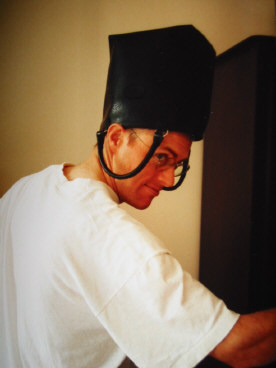

George was born in Tavistock, a small town on the edge of Dartmoor in the southwest of England.
To start at the beginning, always a good place to start, the camera zooms in on the Cornish village of Harrowbarrow. Worried by muck-spreaders and marauding geese, the infant George learned basic ball skills while waiting for his brother Hamish to come home from school. But before he had a proper chance to make an impact on the grass of his parents' front lawn, the first of many moves saw George transferred to the Leaze Junior School in Thornbury, outside Bristol. It was here he made his debut playing first left-back, then centre-forward, a versatility that was to serve this journeyman well in his long and varied career.
Aged seven and three-quarters George moved back to his hometown where he took on the captaincy of the local team under manager Jim Foxhall. With team practices every Saturday morning on the edge of the moor, dinking and diving this way and that, carefully avoiding the gorse bushes and sheep shit, George soon grew accustomed to the new position he found himself being asked to play in, that of centre-half. Marshalling his troops from the midfield, laying off passes to Jeremy Dixon and Johnny Kilpatrick on the flanks, George led the team to impressive wins against their local rivals Milton Coombe (10-0, but it could have been double figures, Brian), and Buckland Monarchorum.
After two action-packed years in the stannery town of ten thousand, fate took George back to Bristol to join the Clifton College under-11 side. Given the job of running the channels on the left-wing, it was during this time that George developed his wickedly curling cross which was to be much copied over the coming years. In the annual grudge match against West Country rivals Chew Magna, played away under leaden skies on a sodden pitch, the ball disappearing into puddles the size of potholes, the team showed great resilience, sacrificing their usual Dutch-style Total Football to adapt their play to the inclement conditions. Their defensive formation was later taken up and made popular in the Italian league where it became known as the catenaccio.
After three years of diligent service, George bade farewell to Clifton, to return once more to his spiritual home, the teeming conurbation that is Plymouth. Alas, a terrible oversight on the part of his management team saw George attend a rugby-playing school where football was not given a space on the curriculum. The trooper that he is, George valiantly attempted to adapt to his new surroundings, playing rugby, cricket, squash and even on occasion tennis. It was to be many years before he would don his football boots again, at least on his home shores. A German club in Nuremberg enticed him over to the Bavarian city, the home of ginger cakes and gluhwein, where the harsh wintry conditions and the heavy diet sapped George's strength and robbed him of his speed down the channels.
A loan spell at Gonville and Caius College, Cambridge, started promisingly, with his first appearance bringing a goal within thirty seconds of the kick-off. His second-half strike in injury time to level the score at 2-2 topped off what was a near-perfect return to top-flight football. Unfortunately distractions off the pitch led to a loss of form, and within months, his earlier hunger for the game had all but gone.
In a bizarre twist of fate, George's career was rescued from its apparent terminal decline when he was given the chance to play in the East. The excitement generated by the emergence of the J-League saw many top players from around the world congregate in Japan. Gary Lineker, Zico, Litbarski, Schillaci, Bebeto, Leonardo, Dunga and George were all able to resurrect their glory days and in doing so, pass on some of their joy for the beautiful game to their Japanese hosts. While many of the aging stars banked their cheques and promptly left Japan to return home to pursue careers in television, a few stayed on: Zico to become the manager of the national team, and George to teach at Daito Bunka University.
Married to Kyoko, perhaps one of the last few Kazu fans still in existence, George lives in quiet contemplation in Yoga, where he spends his Saturday afternoons coaching the Kyosai FC team.
The End
